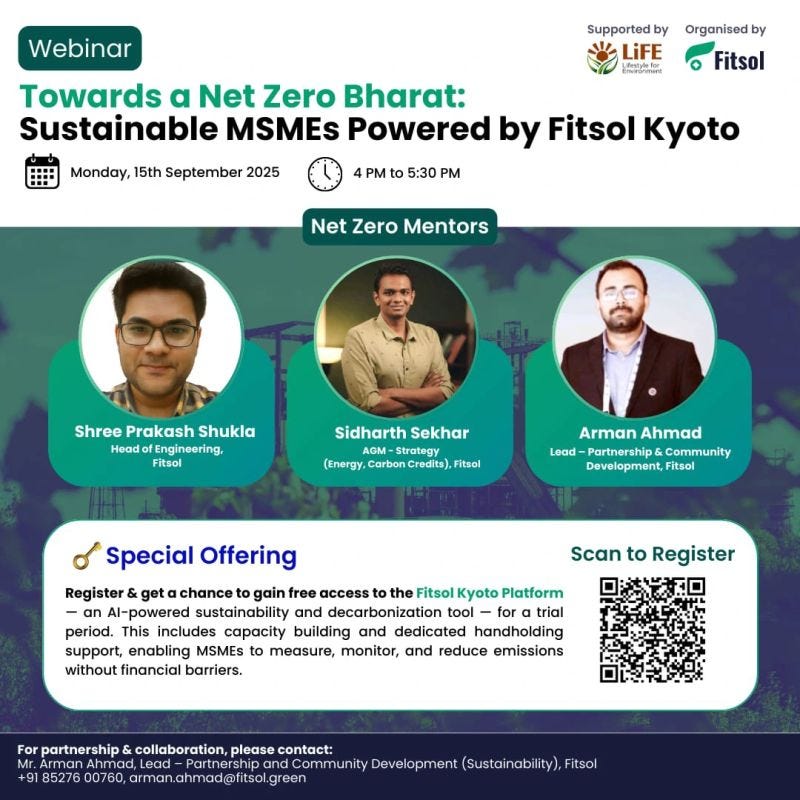The Fitsol Greenprint – 81st Edition

Webinar Alert: Towards a Net Zero Bharat – Sustainable MSMEs Powered by Fitsol Kyoto
MSMEs are the backbone of India’s economy, and now, they have a critical role in driving our Net Zero mission. Join us for an exclusive webinar designed to help small and medium enterprises integrate sustainability into daily operations while staying compliant with evolving climate regulations.
The objective of the webinar is to equip MSMEs with practical tools and strategies to enhance compliance, boost efficiency, and contribute meaningfully to India’s Net Zero journey.
Participating MSMEs will receive free trial access to the Fitsol Kyoto Platform, an AI-powered sustainability and decarbonization tool. This includes capacity building, handholding support, and expert guidance to measure, monitor, and reduce emissions without financial barriers.
Date: Monday, 15th September 2025
Time: 04:00 – 05:30 PM
The Fitsol Fix
Sector Spotlight: Auto – Turning Roadblocks into Opportunities
The auto industry faces a perfect storm of sustainability challenges:
High Scope 3 emissions from sprawling supplier networks.
Energy-intensive manufacturing and dependency on fossil fuels.
Regulatory pressure from BRSR, CSRD, SECR, and CBAM.
EV transition risks, from battery sourcing to recycling gaps.
These pain points not only raise compliance risks but also inflate costs and threaten market access.
The solution lies in visibility and action. Auto companies need real-time carbon accounting, accurate Scope 1–3 data, and AI-driven insights to identify emission hotspots, cut inefficiencies, and align with global standards.
This is where Fitsol delivers.
Greencount: Tracks plant-level and supply chain emissions in real time.
Greenalign: Automates ESG and climate reporting, audit-ready.
AI-powered simulations: Test cleaner fuels, renewable energy, and supplier shifts before implementation.
Compliance-ready outputs: Structured for BRSR, CSRD, SECR, and CBAM disclosures.
With Fitsol, the auto sector doesn’t just meet regulations, it gains efficiency, reduces carbon costs, and builds resilience in a low-carbon economy.
Around the World: Trends Shaping Climate & Business
Carbon Capture and Utilization: New Paper Highlights Opportunities & Gaps
A recent paper highlights the role of Carbon Capture and Utilization (CCU) in building a circular carbon economy. By converting captured CO₂ into products, CCU could contribute up to 15% of the emissions reductions needed for global net-zero by 2070. It also shows how CCU fosters industrial symbiosis, turning emissions from one sector into resources for another. On the policy side, the paper reviews EU initiatives like RED III, FuelEU Maritime, and ReFuel Aviation, while pointing to gaps such as limited incentives, EU ETS challenges, and insufficient funding.
Source: Safety4Sea
Study Links Fossil Fuel Giants to Deadly Heat Waves
For the first time, scientists have quantified how pollution from major fossil fuel and cement companies has directly intensified global heat waves. Published in Nature, the study examined 213 heat waves worldwide (2000–2023) and found they are now 200 times more likely due to climate change compared to just two decades earlier. Researchers concluded that as many as 25% of extreme heat events would have been virtually impossible without emissions from the 14 biggest “carbon majors”, including ExxonMobil, Chevron, and the former Soviet Union. These entities are also responsible for half the rise in heat wave intensity, raising new questions of accountability and liability for climate-related damages.
Source: CNN
U.S. Exit Reshapes Global ESG: Europe & Asia Take the Lead
The U.S. withdrawal from the UN SDGs, UNHRC, and UNESCO has created a major shift in global ESG priorities. With Washington rolling back climate risk disclosures and ESG investment rules, a leadership vacuum has emerged.
Europe is stepping in with its CSRD and stricter corporate reporting requirements, while Asia is gaining ground through bold moves like Japan’s GX Transition Bonds, Singapore’s ISSB-aligned standards, and South Korea and Thailand’s ESG-driven finance reforms.
The result: a fragmented ESG landscape where Europe and Asia are setting the pace, turning sustainability into both a compliance mandate and a competitive advantage—while U.S. firms risk being left behind.
Source: Know ESG
As the number one decarbonization solutions provider, Fitsol is proudly setting the standard for credible, tech-driven climate action across the carbon value chain. Join us as we take charge in redefining sustainability for a greener tomorrow.
Source Url: https://fitsol.green/resources